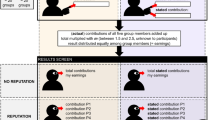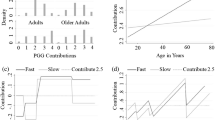Abstract
Cooperation is central to human social behaviour1,2,3,4,5,6,7,8,9. However, choosing to cooperate requires individuals to incur a personal cost to benefit others. Here we explore the cognitive basis of cooperative decision-making in humans using a dual-process framework10,11,12,13,14,15,16,17,18. We ask whether people are predisposed towards selfishness, behaving cooperatively only through active self-control; or whether they are intuitively cooperative, with reflection and prospective reasoning favouring ‘rational’ self-interest. To investigate this issue, we perform ten studies using economic games. We find that across a range of experimental designs, subjects who reach their decisions more quickly are more cooperative. Furthermore, forcing subjects to decide quickly increases contributions, whereas instructing them to reflect and forcing them to decide slowly decreases contributions. Finally, an induction that primes subjects to trust their intuitions increases contributions compared with an induction that promotes greater reflection. To explain these results, we propose that cooperation is intuitive because cooperative heuristics are developed in daily life where cooperation is typically advantageous. We then validate predictions generated by this proposed mechanism. Our results provide convergent evidence that intuition supports cooperation in social dilemmas, and that reflection can undermine these cooperative impulses.
This is a preview of subscription content, access via your institution
Access options
Subscribe to this journal
Receive 51 print issues and online access
$199.00 per year
only $3.90 per issue
Buy this article
- Purchase on Springer Link
- Instant access to full article PDF
Prices may be subject to local taxes which are calculated during checkout



Similar content being viewed by others
References
Trivers, R. The evolution of reciprocal altruism. Q. Rev. Biol. 46, 35–57 (1971)
Fudenberg, D. & Maskin, E. The folk theorem in repeated games with discounting or with incomplete information. Econometrica 54, 533–554 (1986)
Nowak, M. A. & Sigmund, K. Evolution of indirect reciprocity. Nature 437, 1291–1298 (2005)
Boyd, R., Gintis, H., Bowles, S. & Richerson, P. J. The evolution of altruistic punishment. Proc. Natl Acad. Sci. USA 100, 3531–3535 (2003)
Milinski, M., Semmann, D. & Krambeck, H. J. Reputation helps solve the ‘tragedy of the commons’. Nature 415, 424–426 (2002)
Rockenbach, B. & Milinski, M. The efficient interaction of indirect reciprocity and costly punishment. Nature 444, 718–723 (2006)
Rand, D. G., Dreber, A., Ellingsen, T., Fudenberg, D. & Nowak, M. A. Positive interactions promote public cooperation. Science 325, 1272–1275 (2009)
Fehr, E. & Gächter, S. Altruistic punishment in humans. Nature 415, 137–140 (2002)
Rand, D. G., Arbesman, S. & Christakis, N. A. Dynamic social networks promote cooperation in experiments with humans. Proc. Natl Acad. Sci. USA 108, 19193–19198 (2011)
Sloman, S. A. The empirical case for two systems of reasoning. Psychol. Bull. 119, 3–22 (1996)
Stanovich, K. E. & West, R. F. Individual differences in rational thought. J. Exp. Psychol. 127, 161–188 (1998)
Chaiken, S. & Trope, Y. Dual-Process Theories in Social Psychology (Guilford, 1999)
Kahneman, D. A perspective on judgment and choice: mapping bounded rationality. Am. Psychol. 58, 697–720 (2003)
Plessner, H., Betsch, C. & Betsch, T. Intuition in Judgment and Decision Making (Lawrence Erlbaum, 2008)
Kahneman, D. Thinking, Fast and Slow (Straus and Giroux, 2011)
Shiffrin, R. M. & Schneider, W. Controlled and automatic information processing: II. Perceptual learning, automatic attending, and a general theory. Psychol. Rev. 84, 127–190 (1977)
Miller, E. K. & Cohen, J. D. An integrative theory of prefrontal cortex function. Annu. Rev. Neurosci. 24, 167–202 (2001)
Frederick, S. Cognitive reflection and decision making. J. Econ. Perspect. 19, 25–42 (2005)
Horton, J. J., Rand, D. G. & Zeckhauser, R. J. The online laboratory: conducting experiments in a real labor market. Exp. Econ. 14, 399–425 (2011)
Pfeiffer, T., Tran, L., Krumme, C. & Rand, D. G. The value of reputation. J. R. Soc. Interface http://dx.doi.org/10.1098/rsif.2012.0332 (20 June 2012)
Fudenberg, D., Rand, D. G. & Dreber, A. Slow to anger and fast to forgive: cooperation in an uncertain world. Am. Econ. Rev. 102, 720–749 (2012)
Dreber, A., Rand, D. G., Fudenberg, D. & Nowak, M. A. Winners don't punish. Nature 452, 348–351 (2008)
Shenhav, A., Rand, D. G. & Greene, J. D. Divine intuition: cognitive style influences belief in God. J. Exp. Psychol. Gen.. 141, 423–428 (2012)
Benhabib, J. & Bisin, A. Modeling internal commitment mechanisms and self-control: a neuroeconomics approach to consumption–saving decisions. Games Econ. Behav. 52, 460–492 (2005)
Fudenberg, D. & Levine, D. K. A. Dual-self model of impulse control. Am. Econ. Rev. 96, 1449–1476 (2006)
McClure, S. M., Laibson, D. I., Loewenstein, G. & Cohen, J. D. Separate neural systems value immediate and delayed monetary rewards. Science 306, 503–507 (2004)
Bowles, S. & Gintis, H. in The Economy as a Evolving Complex System 3 (eds Blume, L. and Durlauf, S. N. ). 339–364 (2002)
Richerson, P. J. & Boyd, R. Not by Genes Alone: How Culture Transformed Human Evolution. (Univ. Chicago Press, 2005)
Warneken, F. & Tomasello, M. Altruistic helping in human infants and young chimpanzees. Science 311, 1301–1303 (2006)
Bowles, S. Policies designed for self-interested citizens may undermine “the moral sentiments”: evidence from economic experiments. Science 320, 1605–1609 (2008)
Acknowledgements
We thank H. Ahlblad, O. Amir, F. Fu, O. Hauser, J. Horton and R. Kane for assistance with carrying out the experiments, and P. Blake, S. Bowles, N. Christakis, F. Cushman, A. Dreber, T. Ellingsen, F. Fu, D. Fudenberg, O. Hauser, J. Jordan, M. Johannesson, M. Manapat, J. Paxton, A. Peysakhovich, A. Shenhav, J. Sirlin-Rand, M. van Veelen and O. Wurzbacher for discussion and comments. This work was supported in part by a National Science Foundation grant (SES-0821978 to J.D.G.). D.G.R. and M.A.N. are supported by grants from the John Templeton Foundation.
Author information
Authors and Affiliations
Contributions
D.G.R., J.D.G. and M.A.N. designed the experiments, D.G.R. carried out the experiments and statistical analyses, and D.G.R., J.D.G. and M.A.N. wrote the paper.
Corresponding author
Ethics declarations
Competing interests
The authors declare no competing financial interests.
Supplementary information
Supplementary Information
This file contains Supplementary Text 1-15, Supplementary Figures 1-3, Supplementary Tables 1-18 and additional references (See page 1 for details). (PDF 1622 kb)
Rights and permissions
About this article
Cite this article
Rand, D., Greene, J. & Nowak, M. Spontaneous giving and calculated greed. Nature 489, 427–430 (2012). https://doi.org/10.1038/nature11467
Received:
Accepted:
Published:
Issue Date:
DOI: https://doi.org/10.1038/nature11467
This article is cited by
-
When Are We More Ethical? A Review and Categorization of the Factors Influencing Dual-Process Ethical Decision-Making
Journal of Business Ethics (2024)
-
Age-dependent changes in intuitive and deliberative cooperation
Scientific Reports (2023)
-
Assortativity in cognition
Scientific Reports (2023)
-
The problem of opportunity
Biology & Philosophy (2023)
-
Invariance of equilibrium to the strategy method I: theory
Journal of the Economic Science Association (2023)
Comments
By submitting a comment you agree to abide by our Terms and Community Guidelines. If you find something abusive or that does not comply with our terms or guidelines please flag it as inappropriate.



